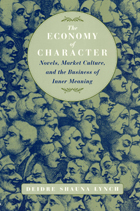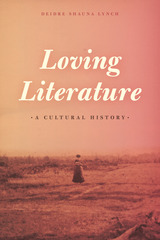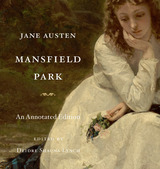
Although the story of this shift is usually told in terms of the "rise of the individual," Deidre Shauna Lynch proposes an ingenious alternative interpretation. Elaborating a "pragmatics of character," Lynch shows how readers used transactions with characters to accommodate themselves to newly commercialized social relations. Searching for the inner meanings of characters allowed readers both to plumb their own inwardness and to distinguish themselves from others. In a culture of mass consumption, argues Lynch, possessing a belief in the inexpressible interior life of a character rendered one's property truly private.
Ranging from Defoe and Smollett to Burney and Austen, Lynch's account will interest students of the novel, literary historians, and anyone concerned with the inner workings of consumer culture and the history of emotions.

That question led Deidre Shauna Lynch into the historical and cultural investigation of Loving Literature. How did it come to be that professional literary scholars are expected not just to study, but to love literature, and to inculcate that love in generations of students? What Lynch discovers is that books, and the attachments we form to them, have played a vital role in the formation of private life—that the love of literature, in other words, is deeply embedded in the history of literature. Yet at the same time, our love is neither self-evident nor ahistorical: our views of books as objects of affection have clear roots in eighteenth- and nineteenth-century publishing, reading habits, and domestic history.
While never denying the very real feelings that warm our relationship to books, Loving Literature nonetheless serves as a riposte to those who use the phrase “the love of literature” as if its meaning were transparent. Lynch writes, “It is as if those on the side of love of literature had forgotten what literary texts themselves say about love’s edginess and complexities.” With this masterly volume, Lynch restores those edges and allows us to revel in those complexities.

Jane Austen’s most ambitious novel, Mansfield Park, has always generated debate. Austen herself noted that debate when she conducted a reader survey, recording her acquaintances’ mixed reviews in a booklet she entitled “Opinions of Mansfield Park.” Is this novel’s dutiful heroine, Fanny Price, admirable? Or is she (as Austen’s own mother asserted) “insipid”? Is Fanny actually the heroine, or does that title belong more properly to her rival, Mary Crawford? Does Fanny’s uncle, Sir Thomas Bertram, act as her benefactor, or as a domestic tyrant? In her notes and introduction to this final volume in Harvard’s celebrated annotated Austen series, Deidre Shauna Lynch outlines the critical disagreements Mansfield Park has sparked and suggests that Austen’s design in writing the novel was to highlight, not downplay, the conflicted feelings its plot and heroine can inspire.
Lynch also engages head-on with the novel’s experimentalism, its technical virtuosity, and its undiminished capacity, two centuries later, to disturb and to move. Annotations clarify the nuances of Austen’s language and explain the novel’s literary allusions and its engagements with topical controversies over West Indian slavery and the conduct of Britain’s war against France. The volume’s numerous illustrations enable readers to picture the world Mansfield Park’s characters inhabit, underscoring the novel’s close attention to setting and setting’s impact on character.
Mansfield Park: An Annotated Edition opens up facets of the novel for even devoted Janeites while extending an open hand to less experienced readers. It will be a welcome addition to the shelf of any library.
READERS
Browse our collection.
PUBLISHERS
See BiblioVault's publisher services.
STUDENT SERVICES
Files for college accessibility offices.
UChicago Accessibility Resources
home | accessibility | search | about | contact us
BiblioVault ® 2001 - 2024
The University of Chicago Press









